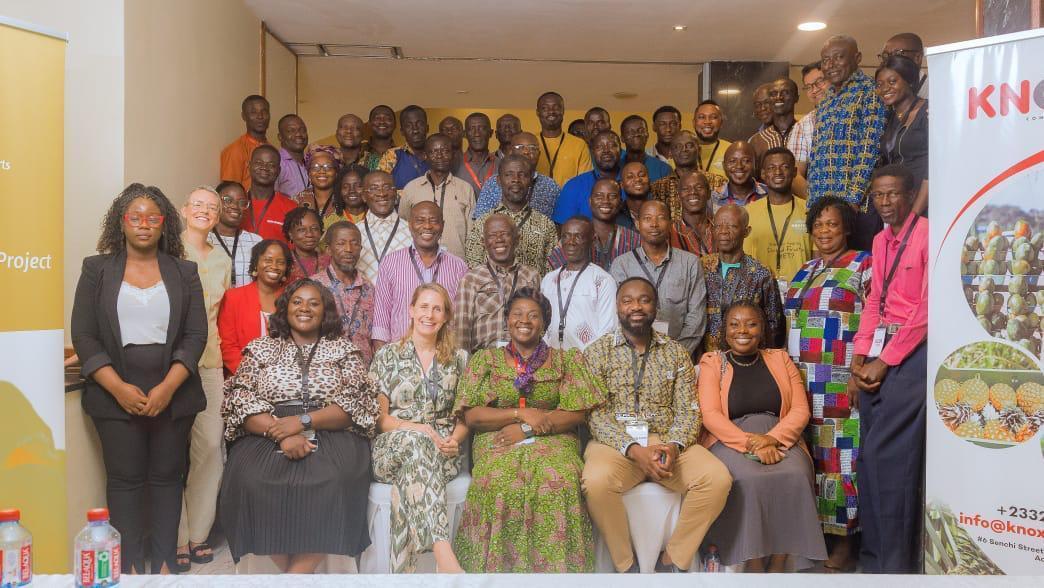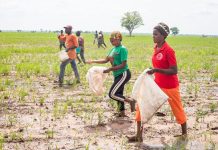Africa-Press – Ghana. Ghana’s premium tropical fruits, including mango, pineapple, coconut, papaya, and banana, are being highly sought after in key international markets such as Belgium, the United States, and the United Kingdom.
The Country’s competitive advantages include ideal growing conditions and premium fruit varieties, international certifications and quality standards, responsive and reliable supply chains, a skilled and increasingly youthful workforce and a supportive policy and regulatory environment.
Dr Solomon Gyan-Ansah, the Director of the Crop Services Directorate at the Ministry of Food and Agriculture, said Ghana could significantly benefit from the rising global demand for dried and processed fruits.
Dr Gyan-Ansah said this in a speech read on his behalf at the special sector workshop titled “Export Demand for Processed Fruits & Raw Material Supply.”
The workshop was attended by fruit producers, processors, exporters, representatives from the Ghana Export Promotion Authority, Crop Services of the Ministry of Food and Agriculture, and Development partners from the dried fruit sector.
The workshop was under the Ghana Dried Fruits project, funded by the Netherlands Ministry of Foreign Affairs, through the Centre for the Promotion of Imports from Developing Countries (CBI), with local coordination by Knox Consulting Limited.
The event brought sector actors together to address bottlenecks and bring holistic solutions to build a resilient export fruit sector, and it is a sequel to many successful ones organised to foster collaboration among sector actors.
The workshop on the theme: “Export Demand for Processed Fruits and Raw Material Supply” sought to provide a platform for stakeholders to strategise on how Ghana’s raw material supply chain for fruits can be better organised to meet the growing export demand of the European Union and other high-end markets.
It provides opportunities for individuals to share experiences and best practices, as well as explore strategies to enhance competitiveness along the value chain.
The Ministry commended private partners that adopted sustainable practices and inclusive models to drive the country towards its development agenda.
Madam Femke Dekker, CBI Programme Manager, said the project aimed to foster sustainable growth within Ghana’s processed fruits and vegetables industry with a particular focus on the dried fruits sector.
She emphasised that ensuring the sector remained attractive and rewarding for the next generation was essential for long-term development.
“By bringing key actors together, we aim to cultivate a vibrant and inclusive value chain that meets buyer expectations and strengthens the connection between Ghana and international markets,” she added.
Mrs Sheila Assibey-Yeboah, the Managing Partner, representing Knox Consulting Limited, the National Coordinator of the CBI Dried Fruits Project, said, “The workshop represents a significant step towards positioning Ghana as a reliable supplier of quality raw materials that meet EU standards and other global markets.”
She said it was important to empower local enterprises to thrive in the export market, highlighting that doing so would strengthen collaboration among sector actors.
She said it would create opportunities for youth and vulnerable groups, as well as enable women to take leadership roles in making Ghana a leading source of quality raw materials.
Mr Raymond Rashid Kramer, the Deputy CEO of the Ghana Export Promotion Authority, said GEPA had commenced the Ghana Trade House initiative to promote made-in-Ghana processed goods abroad.
He said the Authority had established physical trade houses abroad to promote market access, develop a business climate, enhance product visibility, and facilitate the economic integration of Ghanaian commodities.
“The goal is to boost non-traditional exports, foster to boost non-traditional exports, foster economic integration, and promote made in Ghana goods,” he said.
The workshop brought together the Ghanaian delegation who participated in the Anuga 2025 Conference held in Germany to share their experiences with value chain actors in the fruit sector.
For More News And Analysis About Ghana Follow Africa-Press







